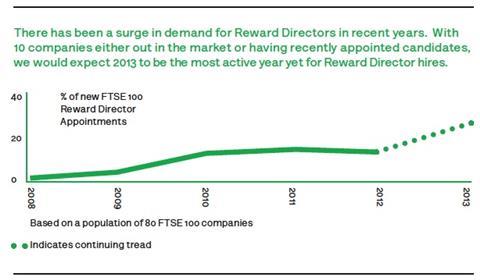Since 2010, there have been 39 reward director appointments across the FTSE 100, according to a report by executive search firm Hedley May.
The Changing faces at the Remco: strategies for navigating today’s remuneration landscape report, which conducted 36 interviews with chairmen, remuneration committee (Remco) chairs, HR directors and reward directors, found that the reward director is also now typically the highest paid of the HR director’s reports.
It also found that the current executive remuneration landscape requires high-quality individuals with a more exceptional and specific skillset than in the past.
For example, reward directors on remuneration committees must be broad business thinkers while still being technical experts.
The report also found:
- Communication skills are paramount for reward directors on remuneration committees.
- In the evolution of the reward director role, the biggest change has been the degree of strategic and business understanding that the job now requires.
- Reward professionals need a deep understanding of their organisation’s underlying commercial drivers, requiring them to ‘get under the skin’ of the business in a way that has not been expected of them in the past.
- In the development of reward proposals, reward directors must be able to test these with the executive and with the remuneration committee.
The report stated: “Historically, UK organisations could operate in a vacuum with regard to remuneration policy.
“But today, they find themselves in a hostile environment, in which political pressure to rein in executive remuneration, shareholder demands for a fair deal and sensationalist media coverage are the norm. Designing simple and transparent remuneration policies that are acceptable to shareholders and aligned with the business strategy is now the aim.
“In this report, we examine how organisations are adapting to this new requirement in an adverse landscape. We do not focus on the quantum of executive pay, but instead analyse the skills that are now required of the key players involved: remuneration committee chairs, HR directors and reward directors, and how these individuals engage with executive management and institutional shareholders.”























